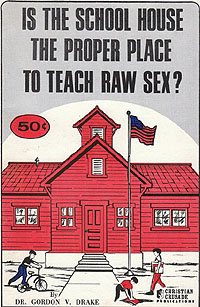|
Puritanism — the haunting fear
that someone, somewhere, may be happy.
|
|
H. L. Mencken, Chrestomathy
|
To the Jesus of the gospels, there was no connection between
sex and evil, so it is sobering to consider how much misery,
suffering, and death has resulted over the centuries from the
connection made by Christians.
Churches have been responsible for fostering unhealthy attitudes,
criminalising harmless activities, propagating medical nonsense,
denying medical help, mutilating boys and girls, killing homosexuals,
misogyny to the extent of causing the unnecessary deaths of
women, encouraging overpopulation, denying people an ordinary
natural sex life, promoting distorted — even pathological
— views of sex, and then harbouring clerical sex criminals,
for whose proclivities they may well have been at least responsible.
  Traditional
Christian attitudes are still enshrined in laws around the world.
Churches work to ban the sale of contraceptives or make abortion
illegal. Some still deny children sex education, often with
obvious consequences — high rates of pregnancy, venereal
disease and worse. The Samaritans organisation that
helps potential suicides was founded as a result of a thirteen
year old girl committing suicide. She had thought that her first
menstruation must be the consequence of some dreadful disease*. Traditional
Christian attitudes are still enshrined in laws around the world.
Churches work to ban the sale of contraceptives or make abortion
illegal. Some still deny children sex education, often with
obvious consequences — high rates of pregnancy, venereal
disease and worse. The Samaritans organisation that
helps potential suicides was founded as a result of a thirteen
year old girl committing suicide. She had thought that her first
menstruation must be the consequence of some dreadful disease*.
Sociological studies in Europe and America have consistently
shown that both Roman Catholics and Protestants are more likely
to be convicted of crime than non-religious people. While Roman
Catholics excel at crimes of violence, Protestants excel at
sex offences*. Even so,
Roman Catholics are still represented in the statistics for
sex crimes more highly than would be expected from their representation
in the population, particularly for offences against public
decency. Other studies have shown that religious people engage
in less sexual activity than others, and it has been suggested
that religion may be a kind of substitute for sex*
(and even that sexual deprivation may be one of the roots of
religion). Certainly, sexual guilt, even for married people,
is much more common amongst Christians than others. Moreover
the level of guilt seems to be positively correlated with the
degree of Christian conservatism*.
Masters and Johnson found in 1970 that a strict religious upbringing
was one of the chief causes of sexual problems in marriage*.
Churches still campaign to stop sex education in schools.
|